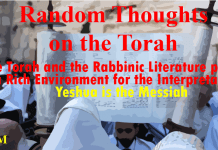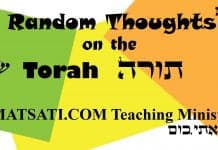Have you ever heard it said that “Our Father” is something Yeshua (Jesus) taught that is new and is only found in the New Testament (NT)? Studying the Scriptures, in reality, referring to the God of Heaven as “Our Father” is not new and is well attested in the Tanach.
Thinking on this question, I thought to myself hmmm I did not think this is a new teaching because this is related to the intimacy between God and his people. While studying the Tanach (Torah, Prophets, and Writtings) we find that it is rare the Lord is referred to as “Father.” However, throughout the Scriptures, we find the father-son motif is fully developed in Israel’s relationship with God. Deeply embedded within the historical narrative and theological framework of the Torah, Israel’s identification with God is illustrated through a family relationship of Father and Son. It was God who promised to deliver His children from Mitzrayim (Egypt) and the Lord graciously chose the people of Israel because of His compassion and mercy (see Shemot / Exodus 34). It is through the first five books of Moshe that we learn the historical perspective how Israel came to know and identify with God as their Creator and Father. Interestingly, the Book of Devarim / Deuteronomy describes the love that exists between Israel and their God. This love is described in and through the covenantal relationship laid out in the scriptures. I chose a few select verses from Exodus, Deuteronomy, Isaiah and Hosea to illustrate this point of the father-son motif and “Our Father” being extant within the pages of the Tanach.
ספר שמות פרק ד פסוק כב
כב וְאָמַרְתָּ אֶל-פַּרְעֹה כֹּה אָמַר יְהֹוָה בְּנִי בְכֹרִי יִשְֹרָאֵל
Shemot / Exodus 4:22
4:22 ‘Then you shall say to Pharaoh, ‘Thus says the Lord, ‘Israel is My son, My firstborn. (NASB)
ספר דברים פרק א פסוק ל-לא
ל יְהוָֹה אֱלֹהֵיכֶם הַהֹלֵךְ לִפְנֵיכֶם הוּא יִלָּחֵם לָכֶם כְּכֹל אֲשֶׁר עָשָֹה אִתְּכֶם בְּמִצְרַיִם לְעֵינֵיכֶם: לא וּבַמִּדְבָּר אֲשֶׁר רָאִיתָ אֲשֶׁר נְשָֹאֲךָ יְהוָֹה אֱלֹהֶיךָ כַּאֲשֶׁר יִשָּׂא-אִישׁ אֶת-בְּנוֹ בְּכָל-הַדֶּרֶךְ אֲשֶׁר הֲלַכְתֶּם עַד-בֹּאֲכֶם עַד-הַמָּקוֹם הַזֶּה
Devarim / Deuteronomy 1:30-31
1:30 ‘The Lord your God who goes before you will Himself fight on your behalf, just as He did for you in Egypt before your eyes, 1:31 and in the wilderness where you saw how the Lord your God carried you, just as a man carries his son, in all the way which you have walked until you came to this place.’ (NASB)
ספר דברים פרק ז פסוק ו-ח
ו כִּי עַם קָדוֹשׁ אַתָּה לַיהוָֹה אֱלֹהֶיךָ בְּךָ בָּחַר | יְהֹוָה אֱלֹהֶיךָ לִהְיוֹת לוֹ לְעַם סְגֻלָּה מִכֹּל הָעַמִּים אֲשֶׁר עַל-פְּנֵי הָאֲדָמָה: ז לֹא מֵרֻבְּכֶם מִכָּל-הָעַמִּים חָשַׁק יְהוָֹה בָּכֶם וַיִּבְחַר בָּכֶם כִּי-אַתֶּם הַמְעַט מִכָּל-הָעַמִּים: ח כִּי מֵאַהֲבַת יְהֹוָה אֶתְכֶם וּמִשָּׁמְרוֹ אֶת-הַשְּׁבֻעָה אֲשֶׁר נִשְׁבַּע לַאֲבֹתֵיכֶם הוֹצִיא יְהוָֹה אֶתְכֶם בְּיָד חֲזָקָה וַיִּפְדְּךָ מִבֵּית עֲבָדִים מִיַּד פַּרְעֹה מֶלֶךְ-מִצְרָיִם
Devarim / Deuteronomy 7:6-8
7:6 ‘For you are a holy people to the Lord your God; the Lord your God has chosen you to be a people for His own possession out of all the peoples who are on the face of the earth. 7:7 ‘The Lord did not set His love on you nor choose you because you were more in number than any of the peoples, for you were the fewest of all peoples, 7:8 but because the Lord loved you and kept the oath which He swore to your forefathers, the Lord brought you out by a mighty hand and redeemed you from the house of slavery, from the hand of Pharaoh king of Egypt. (NASB)
ספר דברים פרק ח פסוק ה
ה וְיָדַעְתָּ עִם-לְבָבֶךָ כִּי כַּאֲשֶׁר יְיַסֵּר אִישׁ אֶת-בְּנוֹ יְהוָֹה אֱלֹהֶיךָ מְיַסְּרֶךָּ
Devarim / Deuteronomy 8:5
8:5 ‘Thus you are to know in your heart that the Lord your God was disciplining you just as a man disciplines his son. (NASB)
ספר דברים פרק לא פסוק ו
ו הַלְיהוָֹה תִּגְמְלוּ-זֹאת עַם נָבָל וְלֹא חָכָם הֲלוֹא-הוּא אָבִיךָ קָּנֶךָ הוּא עָשְֹךָ וַיְכֹנֲנֶךָ
Devarim / Deuteronomy 32:6
32:6 ‘Do you thus repay the Lord, O foolish and unwise people? Is not He your Father who has bought you? He has made you and established you. (NASB)
ספר ישעיה פרק סג פסוק טז
טז כִּי-אַתָּה אָבִינוּ כִּי אַבְרָהָם לֹא יְדָעָנוּ וְיִשְֹרָאֵל לֹא יַכִּירָנוּ אַתָּה יְהֹוָה אָבִינוּ גֹּאֲלֵנוּ מֵעוֹלָם שְׁמֶךָ
Yeshayah / Isaiah 63:16
63:16 For You are our Father, though Abraham does not know us And Israel does not recognize us. You, O Lord, are our Father, Our Redeemer from of old is Your name. (NASB)
ספר ישעיה פרק סד פסוק ז
ז וְעַתָּה יְהֹוָה אָבִינוּ אָתָּה אֲנַחְנוּ הַחֹמֶר וְאַתָּה יֹצְרֵנוּ וּמַעֲשֵֹה יָדְךָ כֻּלָּנוּ
Yeshayah / Isaiah 64:8
64:8 But now, O Lord, You are our Father, We are the clay, and You our potter; And all of us are the work of Your hand. (NASB)
ספר הֹושֵׁעַ פרק יא פסוק א
כִּי נַעַר יִשְׂרָאֵל וָאֹהֲבֵהוּ וּמִמִּצְרַיִם קָרָאתִי לִבְנִֽי׃
Hoshea / Hosea 11:1
11:1 When Israel was a youth I loved him, And out of Egypt I called My son. (NASB)
Examining the Hebrew text (the English translation is taken from the New American Standard bible) to illustrate how the Hebrew bible clearly shows the historical and theological framework of God as “Our Father.” In Exodus God says “Israel is my son my first born” (אָמַר יְהֹוָה בְּנִי בְכֹרִי יִשְֹרָאֵל), Deuteronomy describes God as “disciplining his children as a father does his son” (וְיָדַעְתָּ עִם-לְבָבֶךָ כִּי כַּאֲשֶׁר יְיַסֵּר אִישׁ אֶת-בְּנוֹ יְהוָֹה אֱלֹהֶיךָ מְיַסְּרֶךָּ) and that “He is our Father that has purchased us and established us” (הוּא אָבִיךָ קָּנֶךָ הוּא עָשְֹךָ וַיְכֹנֲנֶךָ), Isaiah goes further and states explicitly that “YHVH, You are our Father” (יְהֹוָה אָבִינוּ אָתָּה), and again in Hosea we find the father-son motif “I called you my son” (קָרָאתִי לִבְנִֽי).
Can there be any arguement for the idea that God is referred to as “Our Father” only after Yeshua walked this earth? I hope this short study is a blessing. Without the Scriptures found in the Tanach (Old Testament) how can we even begin to understand the purpose and reason for Yeshua to come and lay down his life for ours?
Blessings in Yeshua the Messiah,
— MATSATI —








